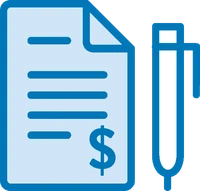Easy Personal Loans from Your Trusted Finance Company
We help people just like you get the money you need. Find out how much money you may qualify for now.


Depending on your state of residence, you could get up to $10,000* today quickly, easily and with the respect you deserve.
At Heights Finance, you are much more than just a credit score. We’ll work with you to create a loan that fits your needs and get your money to you as quickly as possible. And we’ll treat you with the same respect we’d want for our own friends and family members.
Here’s what our customers have to say about us.
(Hint: They like us!)
Here’s what our customers have to say about us.
(Hint: They like us!)
Getting the money you need is as easy as…
FIND YOUR BRANCH
Our conveniently located branches are staffed with friendly, knowledgeable team members who are ready to help.
BRING IN YOUR DOCUMENTS
We'll need to see your ID, proof of residence and proof of income. Please ask one of our team members for additional document requirements.
SIGN FOR YOUR PERSONAL LOAN
We’ll review your information, if you are approved, you’ll sign your documents, and you will be on your way with the money you need.














